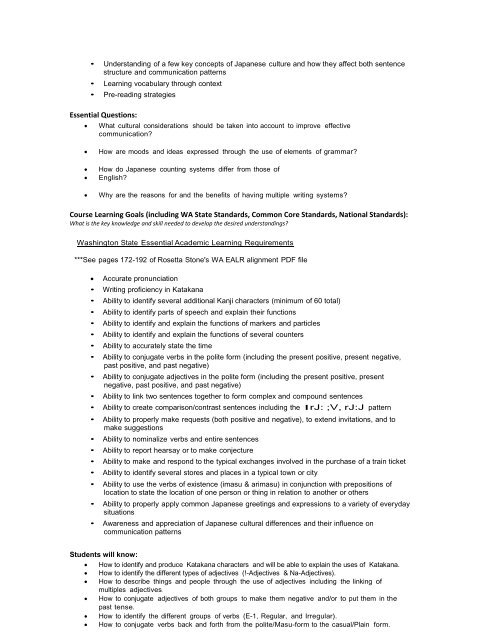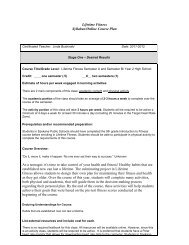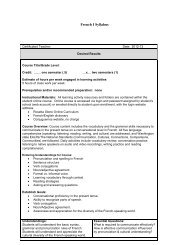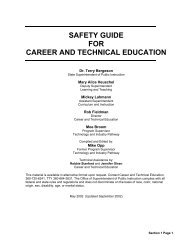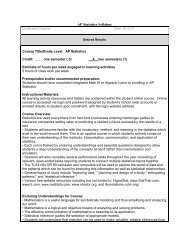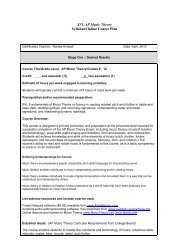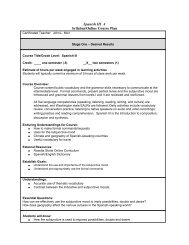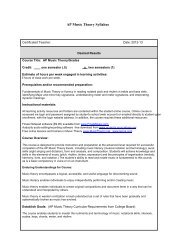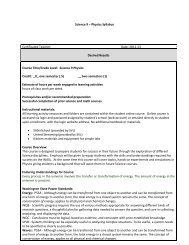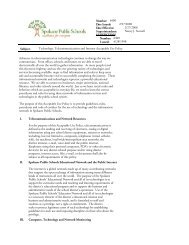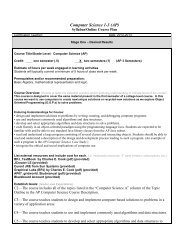Syllabus - Spokane Public Schools
Syllabus - Spokane Public Schools
Syllabus - Spokane Public Schools
Create successful ePaper yourself
Turn your PDF publications into a flip-book with our unique Google optimized e-Paper software.
• Understanding of a few key concepts of Japanese culture and how they affect both sentencestructure and communication patterns• Learning vocabulary through context• Pre-reading strategiesEssential Questions:What cultural considerations should be taken into account to improve effectivecommunication?How are moods and ideas expressed through the use of elements of grammar?How do Japanese counting systems differ from those ofEnglish?Why are the reasons for and the benefits of having multiple writing systems?Course Learning Goals (including WA State Standards, Common Core Standards, National Standards):What is the key knowledge and skill needed to develop the desired understandings?Washington State Essential Academic Learning Requirements***See pages 172-192 of Rosetta Stone's WA EALR alignment PDF fileAccurate pronunciation• Writing proficiency in Katakana• Ability to identify several additional Kanji characters (minimum of 60 total)• Ability to identify parts of speech and explain their functions• Ability to identify and explain the functions of markers and particles• Ability to identify and explain the functions of several counters• Ability to accurately state the time• Ability to conjugate verbs in the polite form (including the present positive, present negative,past positive, and past negative)• Ability to conjugate adjectives in the polite form (including the present positive, presentnegative, past positive, and past negative)• Ability to link two sentences together to form complex and compound sentences• Ability to create comparison/contrast sentences including the I rJ: ;V, rJ:J pattern• Ability to properly make requests (both positive and negative), to extend invitations, and tomake suggestions• Ability to nominalize verbs and entire sentences• Ability to report hearsay or to make conjecture• Ability to make and respond to the typical exchanges involved in the purchase of a train ticket• Ability to identify several stores and places in a typical town or city• Ability to use the verbs of existence (imasu & arimasu) in conjunction with prepositions oflocation to state the location of one person or thing in relation to another or others• Ability to properly apply common Japanese greetings and expressions to a variety of everydaysituations• Awareness and appreciation of Japanese cultural differences and their influence oncommunication patternsStudents will know: How to identify and produce Katakana characters and will be able to explain the uses of Katakana. How to identify the different types of adjectives (!-Adjectives & Na-Adjectives). How to describe things and people through the use of adjectives including the linking ofmultiples adjectives. How to conjugate adjectives of both groups to make them negative and/or to put them in thepast tense. How to identify the different groups of verbs (E-1, Regular, and Irregular). How to conjugate verbs back and forth from the polite/Masu-form to the casual/Plain form.


